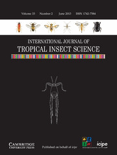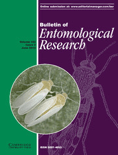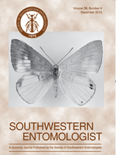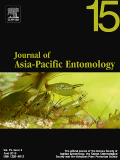
INTERNATIONAL JOURNAL OF TROPICAL INSECT SCIENCE
Scope & Guideline
Uncovering the Secrets of Tropical Insect Life
Introduction
Aims and Scopes
- Insect Pest Management:
Research on the management strategies for insect pests affecting crops, including the efficacy of biological control agents, insecticides, and integrated pest management (IPM) approaches. - Ecology and Biodiversity:
Studies exploring the ecological roles of insects, their diversity in various habitats, and their interactions with other organisms, including plants and predators. - Entomopathogenic Organisms:
Investigations into the use of fungi, bacteria, and nematodes as biological control agents against insect pests, including their mechanisms of action and effectiveness. - Insect Physiology and Behavior:
Research focused on the physiological responses of insects to environmental stressors, insecticides, and their behavioral adaptations in various ecological contexts. - Molecular Entomology:
Studies utilizing molecular techniques for the identification, phylogenetic analysis, and understanding of genetic diversity in insect populations. - Insect-Plant Interactions:
Research examining the relationships between insects and plants, including host plant resistance and the effects of insect herbivory on plant health and productivity. - Insect Conservation and Utilization:
Explorations of the roles of insects in ecosystems and their potential for sustainable use in food and feed, particularly in the context of food security.
Trending and Emerging
- Biopesticides and Natural Products:
There is a growing trend towards research on biopesticides derived from natural products, including plant extracts and microbial agents, as alternatives to synthetic chemicals. - Climate Change Impact on Insects:
Emerging studies are increasingly focusing on the effects of climate change on insect populations, their behavior, and distribution, highlighting the need for adaptive management strategies. - Insect-Microbiome Interactions:
Research into the gut microbiota of insects and its implications for pest management, nutrition, and disease resistance is gaining traction, reflecting the complexity of insect biology. - Sustainable Insect Farming and Utilization:
There is an emerging interest in the cultivation of edible insects as a sustainable protein source and their role in food security, driven by global trends in nutrition and environmental sustainability. - Resistance Mechanisms in Insects:
Studies investigating the biochemical and molecular mechanisms of insecticide resistance are increasingly prevalent, reflecting the ongoing challenge of managing resistant pest populations. - Technological Innovations in Insect Monitoring:
The application of technology, such as remote sensing and molecular techniques, for monitoring insect populations and pest outbreaks is on the rise, enhancing the precision of pest management strategies.
Declining or Waning
- Traditional Chemical Insecticides:
Research focusing on the use of conventional chemical insecticides is decreasing as there is a growing emphasis on integrated pest management (IPM) strategies and the use of biopesticides. - General Insect Taxonomy:
While taxonomic studies are still relevant, there has been a notable decline in purely taxonomic papers as the journal shifts towards research with applied implications in pest management and ecology. - Insect-Induced Plant Damage Studies:
Research specifically focused on the quantification of insect-induced damage on crops is waning, likely due to the increasing interest in holistic approaches that include pest management and ecological interactions.
Similar Journals

Frontiers in Insect Science
Exploring the Wonders of Insect BiologyFrontiers in Insect Science is a pioneering open-access journal dedicated to the advancement of knowledge in the field of insect science. Published by FRONTIERS MEDIA SA in Switzerland, this journal serves as a vital platform for researchers, professionals, and students to disseminate high-quality, peer-reviewed research spanning diverse topics within insect biology, ecology, and pest management. Since its establishment in 2021, the journal has gained recognition, ranking in the Q2 category of Insect Science with a Scopus ranking of #92 out of 181 in the field. With a commitment to promoting open access and collaboration, Frontiers in Insect Science is instrumental in fostering innovative research and practical applications essential for combating biodiversity loss and enhancing agricultural sustainability. As a freely accessible resource, it invites contributions that impact both fundamental and applied insect research, connecting a global network of scholars eager to explore the fascinating world of insects.

REVISTA COLOMBIANA DE ENTOMOLOGIA
Advancing Insect Science in ColombiaREVISTA COLOMBIANA DE ENTOMOLOGIA, published by the SOC COLOMBIANA ENTOMOLOGIA-SOCOLEN, serves as a vital platform for disseminating research in the field of insect science. With an ISSN of 0120-0488, the journal has established itself as a key resource for entomologists, agricultural scientists, and biodiversity researchers, focusing on the ecology, taxonomy, and behavior of insects within the Colombian context and beyond. Despite its Q4 ranking in 2023, REVISTA COLOMBIANA DE ENTOMOLOGIA strives to enhance its impact within the academic community, offering a space for innovative studies and reviews that aim to advance the understanding of insect-related phenomena. As a publication addressing critical concerns in agricultural and biological sciences, it invites contributions that explore new methodologies and findings relevant to the insect world. Although it does not currently offer Open Access options, the journal's growth from 2004 to 2024 reflects its commitment to evolving with the needs of its readership and contributors, making it an essential reference point for students and professionals alike interested in entomological research.

BULLETIN OF ENTOMOLOGICAL RESEARCH
Pioneering Research at the Nexus of Entomology and HealthBULLETIN OF ENTOMOLOGICAL RESEARCH, published by Cambridge University Press, is a prestigious journal that has been at the forefront of entomological research since its inception in 1910. With an impressive track record extending through to 2024, this journal serves as a vital platform for advancing knowledge in various related fields, notably Agronomy and Crop Science and Insect Science, where it ranks in the top quartile (Q2) and maintains a commendable position within the Scopus rankings in its categories. Notably, its contributions also intersect with Medicine in a broader scope, fostering interdisciplinary insights. While access to the journal content is not classified as 'Open Access,' its rigorous peer-reviewed articles are crucial for researchers, professionals, and students seeking to enhance their understanding of entomology and its applications in agronomy and beyond. The journal's impact is reflected in its notable percentile rankings, emphasizing its relevance and influence in the academic community. Located at the heart of the UK, the BULLETIN OF ENTOMOLOGICAL RESEARCH continues to be an essential resource for those dedicated to the study and understanding of insects and their impacts on agriculture and health.

JOURNAL OF INSECT SCIENCE
Bridging Disciplines through Insect StudiesJOURNAL OF INSECT SCIENCE, published by OXFORD UNIV PRESS INC, stands as a pivotal platform in the field of insect science, offering open-access research since 2001. With an impactful presence in the academic community, this journal spans the convergence of entomology and various interdisciplinary studies, establishing itself in the Q2 quartile for both Insect Science and Medicine (miscellaneous) categories as of 2023. This esteemed journal is recognized for its contributions to the understanding and management of insect biology, ecology, and their implications for agriculture and human health, garnering a Scopus rank of 44 out of 181 in Agricultural and Biological Sciences. The Open Access model encourages wide dissemination of knowledge, making the rich repository of research accessible to a global audience. With ongoing publications until 2024, JOURNAL OF INSECT SCIENCE serves as an essential resource for researchers, professionals, and students seeking to deepen their understanding of the crucial role insects play in our ecosystem.

Austral Entomology
Bridging Research and Real-World ApplicationsAustral Entomology, published by Wiley, is a leading journal in the field of entomology, specializing in the study of insects within the wider context of agronomy, ecology, and evolutionary biology. With an impact factor that reflects its growing influence and a commendable H-Index, this journal serves a vital role in disseminating cutting-edge research that bridges the gap between basic entomological studies and applied agricultural practices. Since its inception in 2014, Austral Entomology has maintained a strong commitment to open access, fostering a collaborative environment for researchers and practitioners. Recognized within category quartiles Q2 across multiple fields such as Agronomy and Crop Science and Ecology, it ranks impressively among journals in Insect Science, showcasing the significance of its contributions to understanding insect behavior, ecology, and systematics. Given its robust accessibility options, the journal not only enhances the visibility of entomological research but also empowers professionals and students alike to engage with and apply findings in real-world contexts.

SOUTHWESTERN ENTOMOLOGIST
Pioneering Studies for Ecological and Agricultural ProgressSOUTHWESTERN ENTOMOLOGIST is a pivotal academic journal dedicated to advancing the fields of Agronomy, Ecology, and Insect Science. Published by the SOUTHWESTERN ENTOMOLOGICAL SOC in the United States, this journal plays a crucial role in disseminating vital research findings that address pressing ecological and agricultural challenges. With its ISSN 0147-1724 and E-ISSN 2162-2647, the journal has been publishing comprehensive studies since 1993 and continues to contribute significantly to the knowledge base up to 2024. As a Q4 ranked journal in both Agronomy and Crop Science and Ecology, as well as Insect Science, it provides an inclusive platform for researchers and students to share their insights and foster collaborations. Although it currently does not offer open access options, the content is accessible to academic institutions and professionals, ensuring that significant findings reach a broad audience. Given its niche focus, SOUTHWESTERN ENTOMOLOGIST not only appeals to researchers and students but also to professionals looking to stay updated on the latest trends and developments in entomology and its related fields.

CANADIAN ENTOMOLOGIST
Illuminating the Path of Entomological DiscoveryCanadian Entomologist, published by Cambridge University Press, is a prominent journal dedicated to the field of entomology, covering key areas such as insect science, ecology, and evolutionary biology. With its origins dating back to 1868, this esteemed journal has continuously contributed to the understanding of insect behavior, systematics, and physiology, engaging researchers and professionals alike. Although currently not an Open Access journal, it offers valuable insights through its rigorously peer-reviewed articles, reflecting its commitment to scientific excellence. The journal has garnered a respectable Q3 ranking in various categories, including Ecology, Evolution, Behavior, and Systematics, making it a critical resource for scholars and students who seek to explore the complex interactions within insect populations and their environments. Researchers can trust Canadian Entomologist to provide relevant and impactful research that shapes contemporary understanding in the realm of entomological studies, fostering the growth of this vital scientific discipline.

Insects
Unleashing Knowledge in Insect Ecology and BehaviorInsects is a prominent open-access journal published by MDPI, dedicated to advancing research in the vibrant field of insect science. Since its inception in 2011, this journal has become a vital resource for academics and professionals alike, also ranked in the prestigious Q1 category within the Insect Science field by Scopus, achieving a remarkable rank of 26 out of 181 journals. With an ongoing convergence period from 2010 to 2024, Insects provides comprehensive coverage of various aspects of entomology, including but not limited to ecology, behavior, physiology, and applied entomology. Based in Switzerland, the journal promotes an open-access model, ensuring that vital research is readily available to researchers, practitioners, and students globally. This journal not only facilitates the dissemination of groundbreaking entomological research but also fosters collaboration and interdisciplinary dialogue in the field.

REVISTA DE LA SOCIEDAD ENTOMOLOGICA ARGENTINA
Fostering Global Collaboration in Entomological StudiesREVISTA DE LA SOCIEDAD ENTOMOLOGICA ARGENTINA is an esteemed open-access journal dedicated to the field of entomology, published by the SOCIEDAD ENTOMOLOGICA ARGENTINA. Since its transition to open access in 2013, the journal has sought to promote research in insect science, ecology, and related disciplines, facilitating global dissemination of knowledge and encouraging collaborative studies across borders. Located in the vibrant scientific landscape of La Plata, Argentina, the journal is indexed in Scopus and categorized in the fourth quartile of ecology and insect science, reflecting its commitment to enhancing the discourse within these critical fields. Aiming to bridge the gap between researchers, students, and professionals, REVISTA DE LA SOCIEDAD ENTOMOLOGICA ARGENTINA serves as a platform for innovative research, reviews, and reports on ecological interactions, behavior, and systematic entomology, ultimately driving forward our understanding of insect biodiversity and its broader environmental impacts.

JOURNAL OF ASIA-PACIFIC ENTOMOLOGY
Advancing Insect Science Across the Asia-PacificJOURNAL OF ASIA-PACIFIC ENTOMOLOGY, published by the Korean Society of Applied Entomology, is a distinguished platform that fosters the advancement of knowledge in the field of entomology, specifically tailored to the Asia-Pacific region. Since its inception in 1998, this journal has been instrumental in providing critical insights into the diverse aspects of insect science, reflecting its commitment to supporting both research and application in a variety of contexts, including agriculture and environmental sustainability. The journal is categorized in the Q3 quartile for Insect Science according to the 2023 rankings, and it holds a respectable Scopus rank of #62 out of 181 in its niche, situating it within the top 66th percentile of its field. With a focus on peer-reviewed research that emphasizes innovation and practical applications, the journal serves as an essential resource for researchers, professionals, and students seeking to deepen their understanding of entomological studies and their implications across ecological and agricultural landscapes.